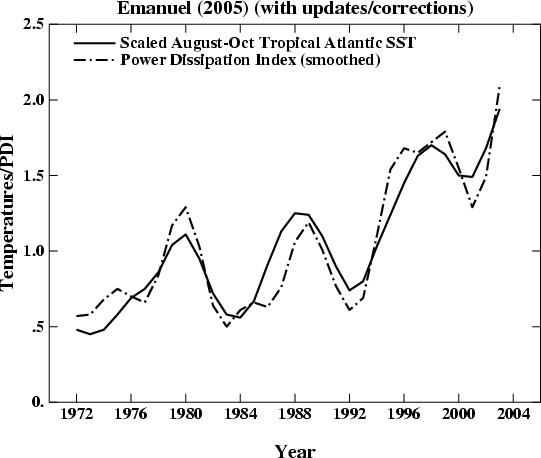Did global warming cause Hurricane Katrina?
Posted on 20 October 2007 by John Cook
One of the criticisms directed towards Al Gore's An Inconvenient Truth is that he claims Hurricane Katrina was caused by global warming. Gore never actually says this and it's useful to look at his exact words as it brings up two broader questions - does global warming cause more frequent hurricanes and does it cause more intense hurricanes?
Does global warming affect hurricane frequency?
In July 2007, Greg Holland of the National Center for Atmospheric Research and Peter Webster of Georgia Tech published a paper Heightened Tropical Cyclone Activity in the North Atlantic: Natural Variability or Climate Trend? They note an increase in the number of observed hurricanes in the North Atlantic over the past century, concluding "increasing cyclone numbers has lead to a distinct trend in the number of major hurricanes and one that is clearly associated with greenhouse warming".
However, this was refuted by Chris Landsea's Counting Atlantic Tropical Cyclones Back to 1900 stating "improved monitoring in recent years is responsible for most, if not all, of the observed trend in increasing frequency of tropical cyclones". In other words, the reason we're recording more hurricanes is due to our improved ability to observe them thanks to aircraft, radar and satellites.

In addition, a 2007 paper by Gabe Vecchi, Increased tropical Atlantic wind shear in model projections of global warming looked at the results of 18 climate models and concluded increased wind shear from rising sea surface temperatures make it more difficult for hurricanes to form and grow. So at this stage, the jury is still out on whether global warming causes more frequent hurricanes.
Does global warming affect hurricane intensity?
Kerry Emanuel wrote the definitive paper on hurricane intensity Increasing destructiveness of tropical cyclones over the past 30 years. Emanuel found a close correlation between hurricane intensity and sea surface temperature. He also suggests wind shear has much less effect on hurricane intensity than increased sea temperatures. This is confirmed by the observed data:

So the empirical evidence linking global warming and hurricane intensity is robust.
What Al Gore said about hurricanes
Here are Gore's words according to a transcript of An Inconvenient Truth by Greg Hoke:
Now I'm going to show you, recently released, the actual ocean temperature. Of course when the oceans get warmer, that causes stronger storms. We have seen in the last couple of years, a lot of big hurricanes. Hurricanes Jean, Francis and Ivan were among them. In the same year we had that string of big hurricanes; we also set an all time record for tornadoes in the United States. Japan again didn't get as much attention in our news media, but they set an all time record for typhoons. The previous record was seven. Here are all ten of the ones they had in 2004.
The science textbooks that have to be re-written because they say it is impossible to have a hurricane in the South Atlantic. It was the same year that the first one that ever hit Brazil. The summer of 2005 is one for the books. The first one was Emily that socked into Yucatan. Then Hurricane Dennis came along and it did a lot of damage, including to the oil industry. This is the largest oil platform in the world after Dennis went through. This one was driven into the bridge at Mobile.
And then of course came Katrina. It is worth remembering that when it hit Florida it was a Category 1, but it killed a lot of people and caused billions of dollars worth of damage. And then, what happened? Before it hit New Orleans, it went over warmer water. As the water temperature increases, the wind velocity increases and the moisture content increases. And you'll see Hurricane Katrina form over Florida. And then as it comes into the Gulf over warm water it becomes stronger and stronger and stronger. Look at that Hurricane's eye. And of course the consequences were so horrendous; there are no words to describe it.
How in god's name could that happen here? There had been warnings that hurricanes would get stronger. There were warnings that this hurricane, days before it hit, would breach the levies and cause the kind of damage that it ultimately did cause. And one question that we, as a people, need to decide is how we react when we hear warnings from the leading scientists in the world.
While not explicitly claiming a connection between hurricane frequency and global warming, Gore does allude to hurricane formation & numbers which gains him some demerit points. However, the general thrust of Al Gore's words are correct in that warmer water causes stronger hurricanes. He clearly doesn't say that Hurricane Katrina was caused by global warming but that warmer waters intensified it. All in all, he scores a pass mark with the way he handles hurricanes with a few marks off for not being clearer on hurricane frequency.































 Arguments
Arguments























 0
0  0
0






Comments